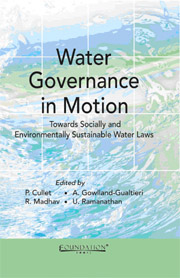Book contents
- Frontmatter
- Contents
- Acknowledgments
- Contributor Biographies
- Introduction
- I Water Law, Policy and Institutional Reforms in India
- II Ongoing Irrigation and Ground Water Reforms in India
- III Perspectives on Privatisation
- IV Environment and Human Rights
- 12 Balancing Development and Environmental Conservation and Protection of the Water Resource Base: The ‘Greening’ of Water Laws
- 13 The Right to Water as a Human Right or a Bird's Right: Does Cooperative Governance Offer a Way Out of a Conflict of Interests and Legal Complexity?
- 14 South Africa's Water Law and Policy Framework: Implications for the Right to Water
- 15 Respect, Protect, Fulfill: The Implementation of the Human Right to Water in South Africa
- V Comparative Perspectives on Reforms
- Bibliography
13 - The Right to Water as a Human Right or a Bird's Right: Does Cooperative Governance Offer a Way Out of a Conflict of Interests and Legal Complexity?
from IV - Environment and Human Rights
Published online by Cambridge University Press: 26 October 2011
- Frontmatter
- Contents
- Acknowledgments
- Contributor Biographies
- Introduction
- I Water Law, Policy and Institutional Reforms in India
- II Ongoing Irrigation and Ground Water Reforms in India
- III Perspectives on Privatisation
- IV Environment and Human Rights
- 12 Balancing Development and Environmental Conservation and Protection of the Water Resource Base: The ‘Greening’ of Water Laws
- 13 The Right to Water as a Human Right or a Bird's Right: Does Cooperative Governance Offer a Way Out of a Conflict of Interests and Legal Complexity?
- 14 South Africa's Water Law and Policy Framework: Implications for the Right to Water
- 15 Respect, Protect, Fulfill: The Implementation of the Human Right to Water in South Africa
- V Comparative Perspectives on Reforms
- Bibliography
Summary
Introduction
The right to water has been recognised as a human right under various international human rights instruments. On the other hand, various international legal instruments to protect nature have led government institutions to reserve enough water for protected areas, for instance wetlands designated under the Convention on Wetlands of International Importance especially as Waterfowl Habitat 1971 (the Ramsar Convention). These international legal obligations may conflict with each other, giving rise to legal problems not only within a country, but also between countries. The latter is the case when two or more countries use the same river as a source of drinking water and for ecological purposes (such as protection of a wetland). In theory, the principle of reasonable and equitable use and the concept of common river basin management, as laid down in the Convention on the Law of the Non-navigational Uses of International Watercourses 1997 (UN Water Convention), are considered to offer a way out of this potential conflict. However, the question is whether, in practice, these principles really are the solution to the conflict between the right to water and the duty to protect wetlands of international importance, and if so, under what conditions do they function adequately.
This chapter consists of a theoretical and an empirical part. The theoretical part (Section 2) will start with an analysis of the international legal instruments on the right to water and the obligation to protect wetlands.
- Type
- Chapter
- Information
- Water Governance in MotionTowards Socially and Environmentally Sustainable Water Laws, pp. 359 - 387Publisher: Foundation BooksPrint publication year: 2010



